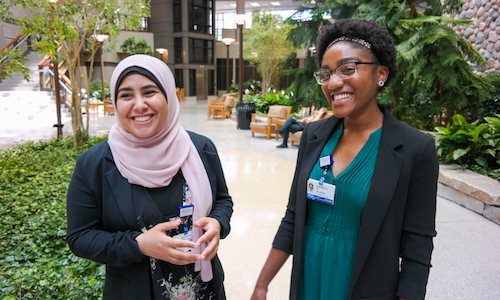
Paid internships are pretty common for students in fields like engineering or business these days. Health and Human Services majors, though, probably shouldn’t count on them. HHS Chair and Professor Patricia Wren points to some baseline economics for a likely reason why unpaid internships are still the norm in her space: “The fact is that many of our students are going to be working with small nonprofits that are paying bills grant to grant,” she says. “An agency is understandably going to put the communities they’re serving first when it comes to resources, and they simply might not have anything left over in the budget for an intern.”
That hasn’t stopped Wren from looking for ways to buck that trendline when conditions are more favorable. One possible opportunity: Healthcare — a field with bigger, more established institutions and where projected labor shortages are making recruitment of emerging talent very competitive. In fact, when Wren recently found herself chatting with Klementina Sula, chief development officer at Henry Ford West Bloomfield Hospital (HFWBH), they discovered plenty of overlapping needs. In particular, Sula explained that HFWBH’s need to court a next-generation workforce aligned pretty neatly with Wren’s goal of building a more robust career pipeline — backed by better internships.
“In healthcare, there is a war for talent out there,” Sula explains. “So it would make a lot of sense for a place like Henry Ford to team up with UM-Dearborn’s Health and Human Services department, which is educating these really talented students. I also teach at UM-Ann Arbor, and I see how tricky it is for students to connect their education to ‘what’s next.’ And an experience that looks and acts a lot like a job has a way of answering the big questions.”
Spurred on by these shared goals, the two partners launched a pilot internship program this summer that puts five HHS students to work at HFWBH. Like the HHS field itself, the range of opportunities is broad: Some of the internships focus on the financial aspects of the healthcare industry, while others let students get a more personal look at the logistics of delivering high-quality patient care. For the hospital, Sula says it offers a chance to make a first impression with students who are about to choose their first post-college employer. For students, it’s a way to see if a particular area in the healthcare space is a good fit for them.
Plus, with support from the Debra Saber-Salisbury Memorial Fund, these HHS students are getting a paycheck for the 25 to 30 hours they’re putting in each week. “Debra was the owner of a successful business that provided human resource services to healthcare organizations," say the trust's advisers David, Terese and Katherine Salisbury. "Throughout her career, she was very interested in developing opportunities for young people, particularly young women. She was personally involved, focusing on mentoring, tutoring and public speaking. This opportunity continues her legacy."
The College of Education, Health, and Human Services is also providing a $1,000 scholarship to each student intern in the eight-week summer program.
“I think this partnership shows you what’s possible when you’re willing to get a little creative,” Wren says. “As a person with public health training, I can say there is sometimes a tension between our priorities and the priorities of some big healthcare institutions. But this relationship has allowed me to see a major player in the Henry Ford Health System as a community partner — and an academic partner. And that’s helping give our students a bigger, better mix of opportunities than they’ve ever had.”





